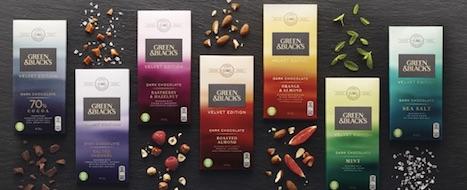
By Sangeeta Waldron — Green & Black's, the brand which pioneered organic Fairtrade chocolate, is now launching its first UK product without the familiar Fairtrade label. Instead, the new Velvet Edition dark chocolate bars that go on sale in the UK this month will carry the Cocoa Life certification, set up by Mondelez International, the owner of Green & Black's. Mondelez calls Cocoa Life "a holistic, cocoa sustainability programme in partnership with Fairtrade". This new Velvet Edition range is based on new origins and uses beans from Ghana, which are sourced sustainably through the Cocoa Life programme.
The Cocoa Life partnership is bringing its expertise of working with farmers to support the sustainability scheme across the previously Fairtrade certified Cadbury Dairy Milk range. This means that the Fairtrade logo will be removed from Cadbury’s Dairy Milk collection this month; by 2019, Cadbury’s entire chocolate range in the UK and Ireland will instead display the Cocoa Life branding. The Fairtrade Foundation announced its new global partnership with Cocoa Life last November, as part of its $400 million programme, which aims to reach 200,000 cocoa farmers and one million community members by 2022. As a result, in the UK, five times as much Cadbury chocolate will now be made with cocoa that has been independently verified by Fairtrade as being sustainably sourced.
In response to the launch of this new product line, the Fairtrade Foundation released a statement, confirming there was no change to the Classic range, which continues to be Fairtrade certified and organic, and that the Fairtrade Mark has not been removed. Euan Venters, Commercial director said: “As Green & Black’s launches a new product line this month, we’re pleased that it’s continuing to offer a range of sustainably sourced chocolate to consumers. For chocolate lovers who want to enjoy fully certified Organic and Fairtrade there will be no changes to Green & Black’s Classic range.”
There are 1.65 million farmers and workers in more than 74 developing countries benefitting from the Fairtrade system, which guarantees decent working conditions and a minimum price. While 90% of the world’s cocoa is grown on small family farms by about six million farmers who earn their living from growing and selling cocoa beans. The main growing regions are Africa, Asia, and Latin America. The largest producing country by volume is Côte d’Ivoire, which produces around 40% of global supply.
However, in spite of the world’s love for chocolate, it is a precarious way of making a living, as the global price for cocoa has fluctuated wildly in recent decades because of weather events and politic upheaval in Côte d’Ivoire. The volatility in prices makes it impossible for cocoa farmers to know how much they would be paid for their cocoa beans in a given year, let alone being able to plan for the future. Now with the removal of the Fairtrade mark, a gold standard of ethical trading and arguably the world’s most trusted food certification scheme – it may leave consumers confused about what they are buying and harder to support the Fairtrade system.
Photo Credit: Cocoa Life
TriplePundit has published articles from over 1000 contributors. If you'd like to be a guest author, please get in touch!














